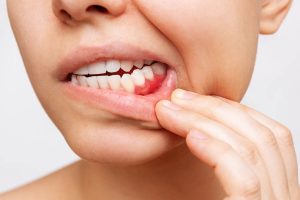 Gum disease, also known as periodontal disease, is a common oral health issue that affects a large percentage of adults. According to the Centers for Disease Control and Prevention (CDC), nearly 50% of adults between the ages of 30 and 65 have some form of gum disease, and this number increases to over 70% in individuals over the age of 65. The good news is that gum disease is highly treatable, especially when detected in its early stages. In this article, we will explore the early signs of gum disease and the importance of early treatment.
Gum disease, also known as periodontal disease, is a common oral health issue that affects a large percentage of adults. According to the Centers for Disease Control and Prevention (CDC), nearly 50% of adults between the ages of 30 and 65 have some form of gum disease, and this number increases to over 70% in individuals over the age of 65. The good news is that gum disease is highly treatable, especially when detected in its early stages. In this article, we will explore the early signs of gum disease and the importance of early treatment.
What is Gum Disease?
Gum disease occurs when infection and inflammation affect the gums and the bone that supports the teeth. The first stage of gum disease is known as gingivitis, which is characterized by inflammation and bleeding gums. If left untreated, gingivitis can progress to periodontitis, a more serious infection that can lead to tooth loss and other complications.
Causes of Gum Disease
Poor oral hygiene is a primary cause of gum disease. When plaque, a sticky film of bacteria, accumulates on the teeth and gums, it can cause inflammation and infection. Other factors that contribute to gum disease include genetics, age, tobacco use, and stress.
Early Signs of Gum Disease
Recognizing the early signs of gum disease is crucial for prompt treatment and prevention of further damage. Here are some of the common early signs to be aware of:
Bad Breath
Persistent bad breath, also known as halitosis, is a common early sign of gum disease. The bacteria in the mouth produce volatile sulfur compounds, leading to an unpleasant odor.
Darkening Gums
Healthy gums should be pink in color. However, when gum disease sets in, the gums may darken or become red and swollen.
Bleeding Gums
Gums that bleed easily, especially during brushing or flossing, can be an indication of gum disease. Healthy gums should not bleed during routine oral hygiene practices.
Gum Tenderness
If your gums are tender or sensitive to touch, it may be a sign of gum disease. Healthy gums should not cause discomfort or pain.
Puffy or Swollen Gums
Gum disease can cause the gums to become puffy or swollen. This can make them appear larger or more prominent than usual.
Receding Gums
As gum disease progresses, the gums may start to recede or pull away from the teeth. This can expose the tooth roots and lead to tooth sensitivity.
Benefits of Early Gum Disease Treatment
Seeking early treatment for gum disease can have several benefits:
Prevents Further Damage
Treating gum disease in its early stages can prevent further damage to the gums, bone, and teeth. Prompt treatment can help save your natural teeth and prevent the need for more extensive dental procedures in the future.
Reduces the Risk of Tooth Loss
Untreated gum disease can lead to tooth loss. By addressing gum disease early on, you can reduce the risk of losing teeth and maintain a healthy smile.
Improves Overall Health
Periodontal health is closely linked to overall health. Chronic gum inflammation has been associated with various systemic conditions, including heart disease, stroke, diabetes, and respiratory diseases. By treating gum disease, you can potentially improve your overall health and reduce the risk of developing these conditions.
Treatment Options for Gum Disease
The treatment for gum disease depends on the severity of the condition. In the early stages, professional dental cleanings, known as scaling and root planing, can effectively remove plaque, tartar, and bacteria from the teeth and gums. This allows the gums to heal and reduces inflammation. In more advanced cases, additional treatments such as antibiotics, gum surgery, or dental restoration may be necessary.
Maintaining Gum Health
Preventing gum disease is essential for maintaining optimal oral health. Here are some tips to help you keep your gums healthy:
Practice Good Oral Hygiene
Brush your teeth at least twice a day and floss daily to remove plaque and bacteria from the teeth and gums. Use a soft-bristled toothbrush and fluoride toothpaste to clean all surfaces of your teeth and along the gumline.
Visit Your Dentist Regularly
Regular dental check-ups and cleanings are crucial for detecting gum disease early on and preventing its progression. Your dentist can assess the health of your gums and provide appropriate treatment or guidance for maintaining gum health.
Quit Smoking
Smoking is a significant risk factor for gum disease. Quitting smoking can improve your gum health and reduce the risk of developing gum disease and other oral health problems.
Eat a Balanced Diet
A nutritious diet plays a vital role in maintaining gum health. Include plenty of fruits, vegetables, whole grains, and lean proteins in your diet. Limit sugary and acidic foods and beverages, as they can contribute to gum disease and tooth decay.
Manage Stress
Stress can weaken the immune system and increase the risk of gum disease. Find healthy ways to manage stress, such as exercising, practicing relaxation techniques, or seeking support from friends and family.
Gum disease is a prevalent oral health issue that can have serious consequences if left untreated. Recognizing the early signs of gum disease and seeking prompt treatment can help prevent further damage, tooth loss, and potential systemic health issues. By practicing good oral hygiene, visiting your dentist regularly, and adopting a healthy lifestyle, you can maintain optimal gum health and preserve your smile for years to come.
Remember, if you notice any signs of gum disease, it’s essential to consult with your dentist for a proper diagnosis and personalized treatment plan.
Contact us (859) 586-7900 for more information or to make an appointment!
—
 About Torbeck Dental
About Torbeck Dental
Torbeck Dental treats every patient with dignity and excellent care. We are highly trained dental professionals with exceptionally friendly and helpful service. We understand that for many, visiting a dentist can be a stressful experience so our comfortable surroundings and compassionate staff will ease any fears you may have. We are here to help you achieve your happiest and healthiest smile! Our dental team are a group of experienced professionals using the latest treatments. Our team has the professional experience to realize that there is no such thing as one-size-fits-all treatment, so we never use a one-size-fits-all approach to your dental plan. We provide quality and personalized oral health care while keeping your individuality in mind. Our goal is to improve and maintain your oral health so you can smile with confidence!
